The A Team
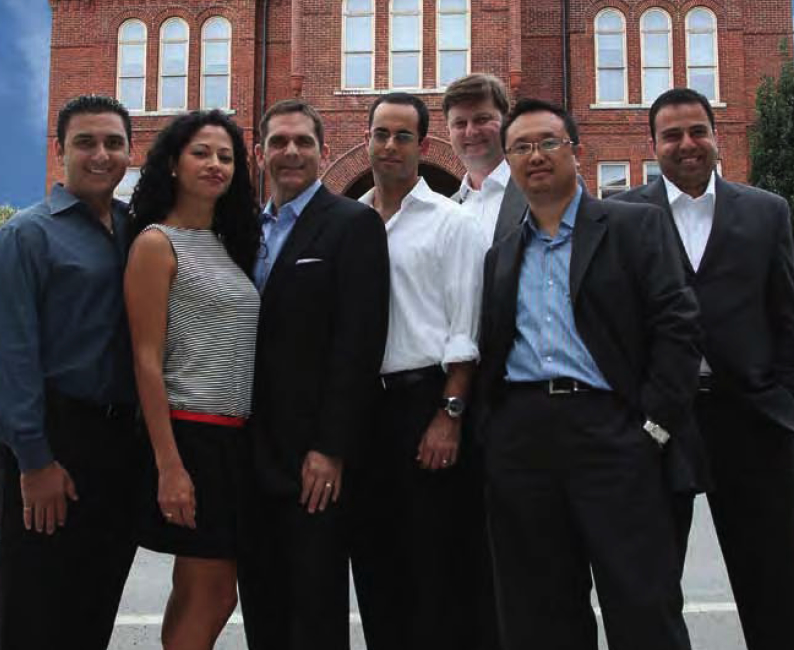
Michael La Penna, CQ-EMBA’11, was visiting family in Phoenix, when he experienced first-hand the reach of his soon-to-be alma mater. The former Director of Collaborative Technologies for Pennsylvania-based Pfizer Pharmaceuticals was taking a break from his Cornell-Queen’s Executive MBA studies when he donned his Queen’s gear to go for a run in the Arizona desert. “I was stopped on the trail by a fellow runner who said, ‘You’re from Queen’s? I’m an alum!’” he laughs. “It was a complete surprise and speaks to the power and range of the Queen’s brand.”
Alumni of other programs might be equally surprised to learn that there are pockets of Queen’s alumni sprinkled throughout the U.S. who share an affinity to QSB. While these American cousins may not know all the words of the Oil Thigh, they, too, have experienced cramming for classes while a February blizzard rages across Lake Ontario, or spent an evening with classmates at a watering hole in the Hub. Though unlike graduates of other QSB programs, these alums have also warmed the seats of Sage Hall’s classrooms in upstate New York and donned that university’s colours (or colors) to cheer on Cornell’s Big Red hockey team.
There’s a new network of Queen’s alums spread throughout the U.S., thanks in part to the Cornell-Queen’s Executive MBA program.
The CQ-EMBA program is delivered in a unique format that creates an interactive, continent-wide classroom where students work with senior faculty from both schools in an intense, team-based learning experience. Three residential sessions in Ithaca and Kingston provide ample opportunity for face-to-face interaction with members of other teams from across North America (see inset photo) From an inaugural class of 60 who graduated in 2007, the program has grown to 120 students in the Class of 2011, many of whom attended convocation ceremonies at both Queen’s and Cornell in May.
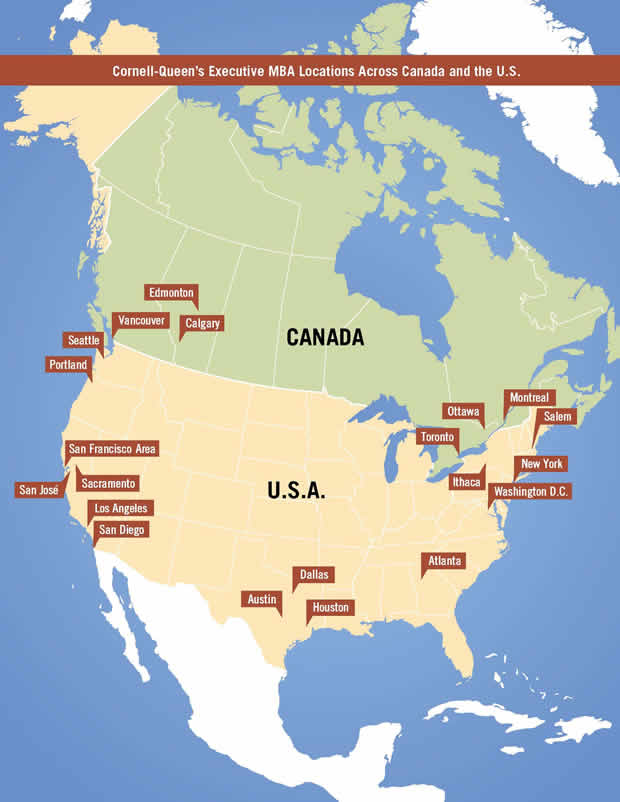 Cross-border learning
Cross-border learning
Michael is one of seven members of the Manhattan A team, one of two such New York-based teams that made up the Cornell-Queen’s MBA class of 2011. He made the trip from Merion Station, PA, to attend classes three Saturdays a month at a boardroom learning centre on Park Avenue, near New York’s fabled Grand Central Station. Manhattan B occupied a facility across the avenue, close enough for discussions to reconvene after class at a neighbouring bar or restaurant.
While these teams were separated by one of New York’s busiest avenues, their other classmates were spread from coast to coast across North America. From Seattle to Edmonton, San José to Ottawa, teams attended classes in their respective boardroom learning centres linked by real-time, interactive videoconferencing technology that includes devices that enable students to raise their hands electronically to ask or respond to questions.
“I admit, I was uncertain about the boardroom format at the start,” says Michael’s teammate Josh Robinson, VP Business Development at Fidelity Information Services in New York. “I wondered if I was going to take to it. Our team caught on quickly, though. And there was an unexpected benefit: I have a much wider network than a more traditional, local program could have offered. I fly to most major cities in North America for my job, and now I have a network in those cities.”
Team member Ziad Fraiwat, a Program Manager with Goodrich Aerospace in Long Island, was able to take advantage of the program’s extended reach. “I travel quite a lot for work,” he explains. “If I was in Seattle visiting a customer, I could always join the Seattle team for one of my classes.”
The sole woman on the team, Daniela Lara, a Vice President for Citi Private Bank, sings the praises of the international aspect of the program. “The networking is incredible. It’s been amazing to meet people from both sides of the border who work in different industries. The diversity of experience is yet another advantage of the program.”
Danny Szpiro, Assistant Dean for Executive Education at Cornell’s Johnson School and founding Director of the CQ-EMBA program, agrees. “The participants represent a far more diverse group of industries and backgrounds than could possibly be the case if they all came from a single city or region.” A student from Seattle, a high-tech hub, is exposed to people from Wall Street to Bay Street, and from the oil and gas industry in Calgary and Houston, he explains.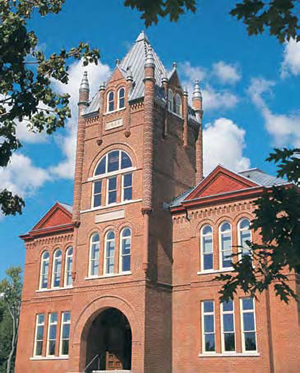 Queen’s Goodes Hall
Queen’s Goodes Hall
A global business perspective
Manhattan’s A Team demonstrates by example that the Cornell-Queen’s program boasts more than just geographic diversity. Its team members hail from India, China, Israel, Lebanon, the U.S. and Mexico. Then there’s the class as a whole: “I’ve made important connections with classmates whose backgrounds range across the U.S., Canada, the U.K., Nigeria, Iran, Pakistan—you name it,” Daniela says. “You really can’t ask for a better experience, given the increasing interconnectedness of the global economy.”
Lessons about the global economy were learned first-hand when the team travelled to Italy and Portugal in September 2010, to complete their Global Business Project, a program requirement. They worked with a leather goods manufacturer in Italy to help it address some of the management and operational challenges it was facing, and proposed strategies for growth. It was field research into the expanding distribution channels that brought the team to Portugal to explore opportunities for their client’s business there.
The Global Business Projects offer students a great opportunity to apply the lessons learned in the classroom, says Shai Dubey, who was QSB’s Director of the Cornell-Queen’s EMBA program until he moved to head up the Full-time MBA program in May. (Read a profile of incoming Director Paul Roman)
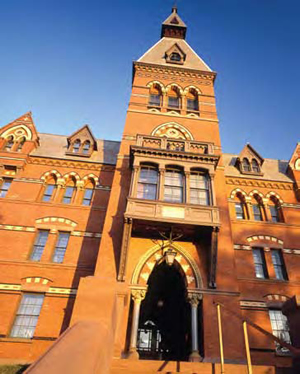 Cornell’s Sage Hall“We’ve had tremendous success with the Global Business Projects,” says Shai. “Our students have provided such value to the companies they’ve worked for over the years that several of these firms have become repeat customers. Similarly, alumni have approached us asking that a team be assigned to their companies to help them tackle a particular challenge, from developing entry strategies to researching expansion opportunities. Repeat business is definitely a sign of success.”
Cornell’s Sage Hall“We’ve had tremendous success with the Global Business Projects,” says Shai. “Our students have provided such value to the companies they’ve worked for over the years that several of these firms have become repeat customers. Similarly, alumni have approached us asking that a team be assigned to their companies to help them tackle a particular challenge, from developing entry strategies to researching expansion opportunities. Repeat business is definitely a sign of success.”
The Global Business Project component has been so successful that companies return year after year to take advantage of the consulting expertise provided by CQ-EMBA teams.
A complementary approach
Both Queen’s and Cornell are renowned for excellence in business education, a factor cited by several members of the team in explaining their choice of this program over others. What surprised some is how seamlessly professors from both business schools coordinated their lectures. “It felt like every prof knew what the professor of the previous class had taught us, as if they’d actually sat in the classroom with us,” says Aner Zafrir, a Sales and Marketing Manager in New York’s diamond industry.
“We see profs from both schools coordinating material across different classes to build outcomes that make for an interesting and enriching experience,” Mike explains. “There’s an outcome that is greater than the sum of its parts.”
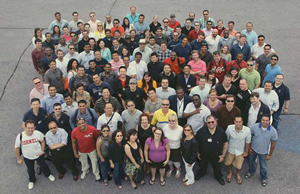 The entire CQ-EMBA Class of 2011 — all smiles before embarking on a Thousand Islands cruise. Bernard Clark
The entire CQ-EMBA Class of 2011 — all smiles before embarking on a Thousand Islands cruise. Bernard Clark
Team dynamics
In talking about their experiences in the program, team members often finish each other’s sentences. Amid the good natured ribbing the tone is playful, the mutual respect palpable. “My teammates became my colleagues and friends. I couldn’t have done the program without them,” explains Jason Zhang, formerly an IT Project Manager with Sun Chemical in New Jersey. “We have a great balance, we all have different expertise and a high level of respect for each other.”
Pitching in and helping out was another team strength. “If anyone was struggling with a deadline, another teammate would offer to pitch in and help,” says Josh.
Kris Chakravarthi, a Software Engineer from New Jersey, offers an example. “I was in the process of building a house, my wife had just had a baby—there were so many things going on in my life, I couldn’t have gotten through without my teammates.”
“Kris is a humble guy, but that’s because he has such high expectations,” Aner interjects. “We’d be on a team call and he’d be right there. We could hear the baby in the background, but he was still in the meeting, still engaged and contributing above and beyond what we expected.”
The Canadian connection
While familiar with their neighbour to the north, most members of the team hadn’t had much exposure to Canada before enrolling in the program. After having completed their studies, all that has changed. Several commented on how much they’d learned about Canada from interacting with their Canadian counterparts and experiencing residential sessions in Kingston.
 Accounting Professor John Moore leads a class delivered via videoconference. They’ve also mastered some of the subtleties of the Canadian experience, including our affinity for a certain expression.
Accounting Professor John Moore leads a class delivered via videoconference. They’ve also mastered some of the subtleties of the Canadian experience, including our affinity for a certain expression.
“I just heard this bad joke in the pub last night: How do you spell Canada?” Mike asks. His response, “CND, as in C-eh? N-eh? D-eh?” elicits groans and laughter from his teammates.
Mastering the use of Canada’s most popular expression didn’t appear on the curriculum, but it’s one of many experiences in cross-border learning that have made their MBA studies a unique experience for this tight-knit team from New York.
